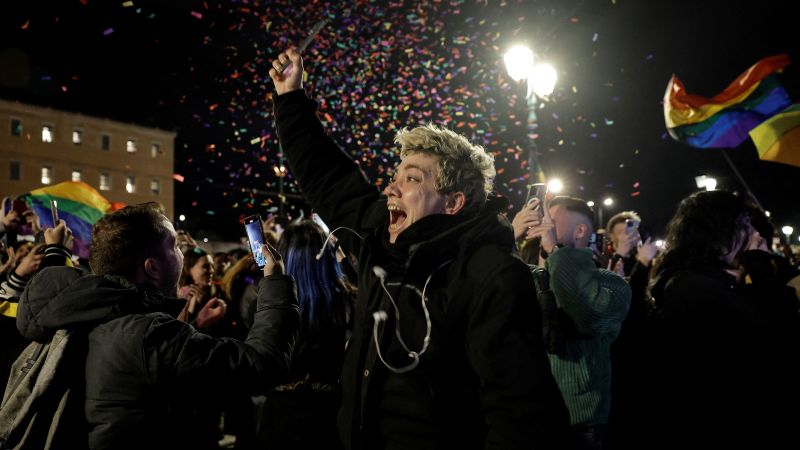- cross-posted to:
- news@lemmy.world
- news@lemmy.world
- cross-posted to:
- news@lemmy.world
- news@lemmy.world
Wow I’m kinda surprised they didn’t have this already. Glad for the LGBTQ+ population but I’m surprised there were still countries in EU where it wasn’t legal (except of course Hungary due to populism)
Bulgaria is an example. The LGBTQ+ community is discussed only during the annual pride parade. Sofia is rather liberal but the rest of the country is highly conservative. The people in power are likely in favour of marriage equality (or most don’t care that much so they just vote with the flow) but it’s a political suicide given the opinion of the most active voters. If you decided to run a country-wide poll, most people would be against gay marriage. The general attitude is “I don’t mind gay people as long as they’re not in my face”. Except many have stronger opinions than that. Especially men.
Speaking of men, the Balkan macho culture created a fear of gay people (literal homophobia). On a regular basis I hear men speaking about being afraid of being raped by gay men in certain situations (think massage rooms, men’s locker rooms, bars).
Football hooligan extremists are especially dangerous because they go on witch hunts for marginalized groups and would attack (and sometimes murder) anyone who looks gay, Turkish, ir has a darker skin colour just for sport. There are still partly unresolved murders of LGBT youth commited a decade ago.
In fact I’m surprised about Greece, they must be the first ortbodox christian country to legalize same sex marriage and they’re very religious compared to us.
Oh ok, I didn’t realise things were so bad there :(
I have never been in Bulgaria but I was in Romania and it was pretty LGBT friendly there. But again. Also in the city. I assume the countryside is much different.
peaking of men, the Balkan macho culture created a fear of gay people (literal homophobia). On a regular basis I hear men speaking about being afraid of being raped by gay men in certain situations (think massage rooms, men’s locker rooms, bars).
So “macho” men complaining they are afraid? Lol.
And of course this won’t happen. In fact what I see is that the more kinky people get, the more important expressed consent becomes. Of course the gay scene is pretty fast and loose with consent in some circles but you won’t end up in those places unless you go looking for them.
Don’t get me wrong, Bucharest and Sofia are rather LGBT friendly as long as you know where you’re safe. (I’ve only visited both for a couple of days on a number of occasions). I can’t speak about other cities but the Orthodox Church is really strong in Romania. Bulgaria on the other hand has soccer extremists/fascists who are particularly dangerous and tend to mob on their targets so it’s hard to even find the culprits by the authorities… Not that they even bother unless it’s a murder.
In fact I had a mob of Bulgarian hooligans in Bucharest of all places yelling “Look dude Rapunzel!” pointing at me (I present masculine but have rather long hair). I felt realy threatened and uncomfortable but I realised they didn’t know I spoke their language and I was in a crowded place so it all passed.
🤖 I’m a bot that provides automatic summaries for articles:
Click here to see the summary
Although Greece introduced civil partnerships for gay couples nearly a decade ago under the left-wing Syriza government, only the biological parents of children in those relationships were recognized as legal guardians.
Like in much of the EU, surrogacy remains a thorny issue and Greek Prime Minister Kyriakos Mitsotakis, who tabled the legislation as “a matter of equality,” clarified early on that this was not something he was willing to tackle.
Fifteen of the European Union’s 27 members have already legalized same-sex marriage and Mitsotakis, empowered by a recent fresh mandate, stuck to his guns to see the bill through, signaling his intention for his government to be further aligned with the more progressive EU forces.
In a letter addressed to all 300 of Greece’s parliamentarians ahead of the vote, the Church’s governing body said the bill places the rights of homosexual adults above the interests of future children, by allowing them “to be parented by same-sex couples and grow up without a father or mother in an environment of confusing gender roles.”
The center-right New Democracy government that sponsored the bill failed to garner the support of some of its own 158 politicians in the 300 seat parliament, requiring votes from center and left opposition parties for the legislation to pass.
Days into his second term, empowered by a landslide election win which saw the centrist and center-left suffer catastrophic losses, Mitsotakis pledged his support for same-sex marriage legislation.
Saved 80% of original text.
Good for them




